中考状语从句讲解及练习
【英语】中考英语状语从句解题技巧(超强)及练习题(含答案)
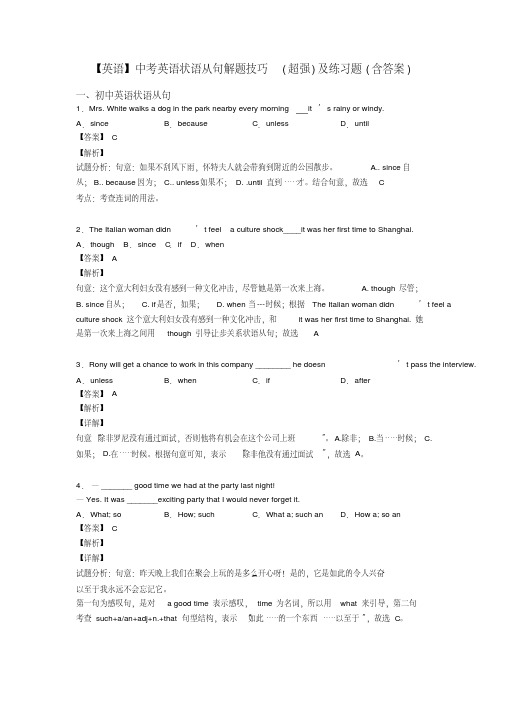
A. after B. since C. when D. until 【答案】 D
【解析】句意: ——列奥纳多直到他在《荒野求生》中才获得奥斯卡奖。
——是的。对他
来说很难实现这个梦想,但他从不放弃。考查连词辨析题。
A. after 在 ……以后; B. since 自
从……; C. when 当……时候; D. until 直到 ……才,多和 not 连用。本句是时间状语从句,四
句意:直到有一天我们自己成为父母,我们才知道父母的爱。考查连词辨析。
before 在 ……
以前; until 直到,和 not 连用表示 “直到 ……才 ”; when 当……的时候; after 在 ……以后。本
句是 “not …unt结il 构”;根据句意结构和语境,可知选 B。
7.I hate traveling by air______you usually have to wait for hours before the plane takes off.
9._____there was no obvious evidence, most people didn
’ t think he was bgbueiltryy.of the ro
A. When
B. While
C. Since
D. As
【答案】 C
【解析】
【详解】
句意 “由于没有明显的证据,大多数人认为他没有犯抢劫罪
B。
12. — It ’ s reported that the plastic polluotin is harming the ocean.
— I saw the report in the newspaper at breakfast. It will be worse _________ stronger laws are
中考英语状语从句解题技巧分析及练习题(含答案)

9.She looked behind from time to time ________ she went in the dark.
A. when 【答案】 B
B. as
C. while
D. before
【解析】
【详解】
句意:她在黑暗中走着,不时回头看看。考查连词辨析。
when , while 都可表示 “……时
A. unless 【答案】 A
B. when
C. if
D. Since
【解析】
【分析】
【详解】
句意:我喜欢新鲜空气,因此我总是让窗户开着,除非真的很冷。考查连词辨析。 A. Unless 除非,相当于 if not ,表条件; B. When 当……的时候; C.If 如果,表条件; D. Since 自从。根据 I enjoy fresh air so always sleep with the window open 可知除非真的很 冷否则总是让窗户开着, unless 符合题意,故选 A。
C. while
D. so that
【解析】
【详解】
句意:准备好以便如果有事发生你可以立即出发。
考查连词。 After 在 ……之后; since 自从,既然; while 当 ……的时候; so that 以便。从句子
之间的关系来说,表示目的,所以要用 “目的状语从句 ”,故本题选 D。
12. ___________ she couldn
号)。根据句意可知,空前和空后之间表示让步,用
although ,故选 A。
17. We don't know the love of our parents _______ we become parents ourselves one day.
【英语】初中必备英语状语从句技巧全解及练习题(含答案)
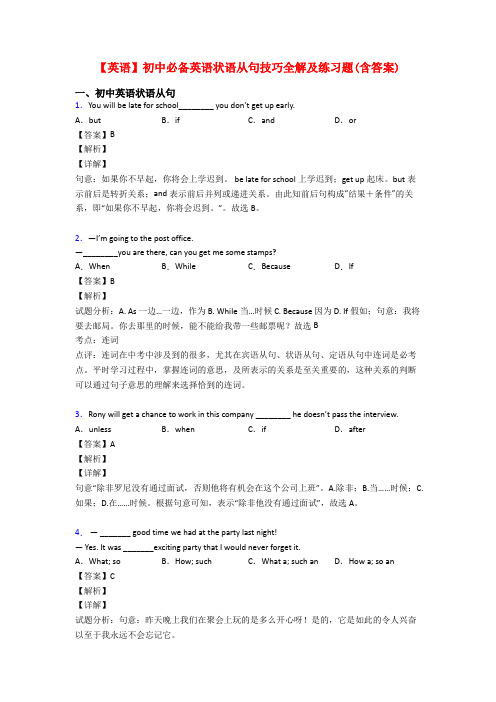
【英语】初中必备英语状语从句技巧全解及练习题(含答案)一、初中英语状语从句1.You will be late for school________ you don’t get up early.A.but B.if C.and D.or【答案】B【解析】【详解】句意:如果你不早起,你将会上学迟到。
be late for school上学迟到;get up起床。
but表示前后是转折关系;and表示前后并列或递进关系。
由此知前后句构成“结果+条件”的关系,即“如果你不早起,你将会迟到。
”。
故选B。
2.—I’m going to the post office.—________you are there, can you get me some stamps?A.When B.While C.Because D.If【答案】B【解析】试题分析:A. As 一边…一边,作为 B. While当…时候 C. Because 因为 D. lf假如;句意:我将要去邮局。
你去那里的时候,能不能给我带一些邮票呢?故选B考点:连词点评:连词在中考中涉及到的很多,尤其在宾语从句、状语从句、定语从句中连词是必考点。
平时学习过程中,掌握连词的意思,及所表示的关系是至关重要的,这种关系的判断可以通过句子意思的理解来选择恰到的连词。
3.Rony will get a chance to work in this company ________ he doesn’t pass the interview. A.unless B.when C.if D.after【答案】A【解析】【详解】句意“除非罗尼没有通过面试,否则他将有机会在这个公司上班”。
A.除非;B.当……时候;C.如果;D.在……时候。
根据句意可知,表示“除非他没有通过面试”,故选A。
4.— _______ good time we had at the party last night!— Yes. It was _______exciting party that I would never forget it.A.What; so B.How; such C.What a; such an D.How a; so an【答案】C【解析】【详解】试题分析:句意:昨天晚上我们在聚会上玩的是多么开心呀!是的,它是如此的令人兴奋以至于我永远不会忘记它。
状语从句 讲解及练习

状语从句状语从句在句中作状语,修饰动词、形容词或副词等。
状语从句有九种,可以用来表示时间、条件、原因、地点、目的、结果、让步、方式、比较等意义。
一、状语从句的连接词。
⑴时间状语从句①连接词: when, while, as, as soon as, since, until, after, before, whenever②例句: I want to see him as soon as he arrives.Whenever he comes, he brings a friend.⑵条件状语从句①连接词: if, unless, as long as(只要)②例句: Unless you study harder you will never pass the examination.As long as I am alive, I will go on studying.⑶原因状语从句①连接词: as, because, since②例句: As the rain had stopped, we went on working.Since we live near the sea, we enjoy a healthy climate.⑷地点状语从句①连接词: where (在…的地方)②例句: Where there is smoke, there is fire.Put it where we can all see it.⑸目的状语从句①连接词: so that, in order that②例句: Finish this so that you can start another.He set out early in order that he might arrive in time.⑹结果状语从句①连接词: so that, so…that, such…that②例句: The bus broke down, so that we had to walk.He was so angry that he couldn’t speak.He is such a good teacher that we all love him.⑺让步状语从句①连接词: though, although, even if, however②例句: Although/Though he is in poor health, he works hard.Even if it rains cats and dogs, I’ll go.⑻方式状语从句①连接词: as, as if②例句: He does as the doctor advises.I will do it as you tell me.⑼比较状语从句①连接词: than, as…as, not so…as, the more…the more②例句: The work is not as easy as I thought.Actions speak louder than words.The more I look at the picture, the better I like it.二、易混连接词区分。
状语从句讲解及练习
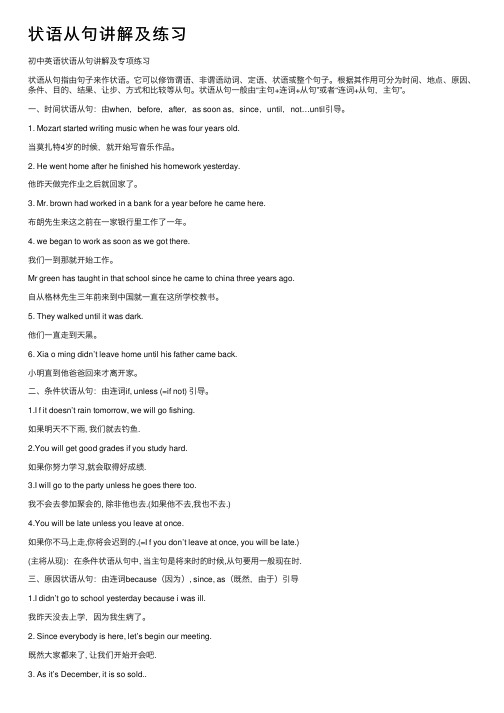
状语从句讲解及练习初中英语状语从句讲解及专项练习状语从句指由句⼦来作状语。
它可以修饰谓语、⾮谓语动词、定语、状语或整个句⼦。
根据其作⽤可分为时间、地点、原因、条件、⽬的、结果、让步、⽅式和⽐较等从句。
状语从句⼀般由“主句+连词+从句”或者“连词+从句,主句”。
⼀、时间状语从句:由when,before,after,as soon as,since,until,not…until引导。
1. Mozart started writing music when he was four years old.当莫扎特4岁的时候,就开始写⾳乐作品。
2. He went home after he finished his homework yesterday.他昨天做完作业之后就回家了。
3. Mr. brown had worked in a bank for a year before he came here.布朗先⽣来这之前在⼀家银⾏⾥⼯作了⼀年。
4. we began to work as soon as we got there.我们⼀到那就开始⼯作。
Mr green has taught in that school since he came to china three years ago.⾃从格林先⽣三年前来到中国就⼀直在这所学校教书。
5. They walked until it was dark.他们⼀直⾛到天⿊。
6. Xia o ming didn’t leave home until his father came back.⼩明直到他爸爸回来才离开家。
⼆、条件状语从句:由连词if, unless (=if not) 引导。
1.I f it doesn’t rain tomorrow, we will go fishing.如果明天不下⾬, 我们就去钓鱼.2.You will get good grades if you study hard.如果你努⼒学习,就会取得好成绩.3.I will go to the party unless he goes there too.我不会去参加聚会的, 除⾮他也去.(如果他不去,我也不去.)4.You will be late unless you leave at once.如果你不马上⾛,你将会迟到的.(=I f you don’t leave at once, you will be late.)(主将从现):在条件状语从句中, 当主句是将来时的时候,从句要⽤⼀般现在时.三、原因状语从句:由连词because(因为), since, as(既然,由于)引导1.I didn’t go to school yesterday because i was ill.我昨天没去上学,因为我⽣病了。
状语从句讲解与练习
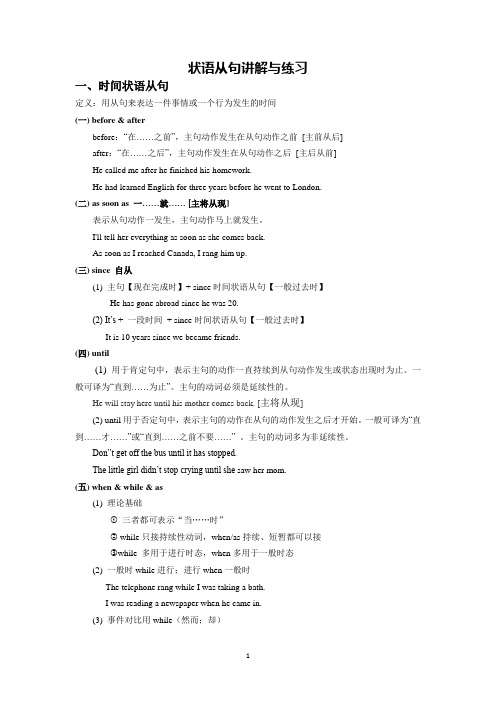
状语从句讲解与练习一、时间状语从句定义:用从句来表达一件事情或一个行为发生的时间(一) before & afterbefore:“在……之前”,主句动作发生在从句动作之前[主前从后]after:“在……之后”,主句动作发生在从句动作之后[主后从前]He called me after he finished his homework.He had learned English for three years before he went to London.(二)as soon as 一……就…… [主将从现]表示从句动作一发生,主句动作马上就发生。
I'll tell her everything as soon as she comes back.As soon as I reached Canada, I rang him up.(三) since 自从(1) 主句【现在完成时】+ since时间状语从句【一般过去时】He has gone abroad since he was 20.(2) It’s + 一段时间+ since时间状语从句【一般过去时】It is 10 years since we became friends.(四) until(1) 用于肯定句中,表示主句的动作一直持续到从句动作发生或状态出现时为止。
一般可译为“直到……为止”。
主句的动词必须是延续性的。
He will stay here until his mother comes back. [主将从现](2) until用于否定句中,表示主句的动作在从句的动作发生之后才开始。
一般可译为“直到……才……”或“直到……之前不要……” 。
主句的动词多为非延续性。
Don”t get off the bus until it has stopped.The little girl didn’t stop crying until she saw her mom.(五) when & while & as(1) 理论基础①三者都可表示“当……时”② while只接持续性动词,when/as持续、短暂都可以接③while 多用于进行时态,when多用于一般时态(2) 一般时while进行;进行when一般时The telephone rang while I was taking a bath.I was reading a newspaper when he came in.(3) 事件对比用while(然而;却)Father was preparing a report while I was playing PC games.He likes coffee while she likes tea.(4) “随着”/“一边…一边”用asThings are getting better and better as time goes on.She sang as she went along.二、原因状语从句because 因为(不与so连用)(1) because &because ofbecause引导原因状语从句because of 是介词短语,后跟n./pron./V-ing,句中作原因状语-- Why didn't he come here?-- He didn’t come here because he was ill.-- He didn’t come here because of his illness.(2) because & for & since & asbecause 语气最强烈;for放句中,用来表示一种附带或补充解释、说明;since & as 通常放句首,作“既然”讲。
中考英语语法专题 原因和让步状语从句讲解+练习

原因和让步状语从句一、原因状语从句用从句来表示主句行为或事件发生的原因,这个从句就是原因状语从句。
常用引导词:because, since, as, for1、because表示人们不知道的直接的原因或理由,着重点在从句;通常用于回答why引出的疑问句,语气最强;除特别强调外,该从句一般位于主句后面;不能与so连用但是可以与so进行同义句转换。
I didn’t go aboard with her because I couldn’t afford it.我没有和她一起出国是因为费用太高。
2、as和since引导的原因状语从句多表示大家众所周知的理由,从句多位于主句之前,since译为“既然”。
如:As I didn’t know the way, I asked a policeman. 我不认识路,因而问警察。
Since traveling by air is much faster, they decided to take a plane. 既然乘飞机旅行快得多,他们就决定坐飞机。
3、for表示的理由是附加的或推断的,并非此原因,通常与主句用逗号隔开,不位于句首,如:He must be not at home, for the telephone isn’t answered.练习(一)用because, as, since, for填空1. We’ll have to go to bed early ________ we’ll start off early tomorrow.2. ________ you know all about it, tell me please.3. ________ all the seats were taken, I had to stand.4. He must be at work, ________ the light in his office is still on.5. Lily didn’t go to school ________ she was ill.二、让步状语从句常用引导词:although, though “尽管虽然”1、两者通常可互换,在口语中,though较为常见。
状语从句讲解及习题附答案

状语从句讲解及习题附答案(一)状语从句概述定义状语从句用作状语,是起副词作用的句子。
位置状语从句可以放在主句之前,也可以放在主句之后,时间、条件、原因和让步状语从句放在句首时需要用逗号和主句隔开。
分类根据其作用可以分为时间、地点、原因、条件、目的、让步、方式和比较等状语从句。
作用它可以修饰谓语、非谓语动词、定语、状语和整个句子。
(二)状语从句详解1. 时间状语从句引导词用法示例when 意为“当…的时候”。
When引导从句的谓语动词可以是延续性动词,也可以是瞬间动词。
并且when有时表示“就在那时”A liar is not believed when he speaks the truth.说谎者讲真话时也没有人相信。
When he arrives, I’ll call you. When you laugh and smile, your body relaxes.while 意为“在…的时候,在…的同时”。
While引导从句的谓语动词必须是延续性的,发生时间较长,并强调主句和从句的动作同时发生(或者相对应)。
While有时还可以表示对比。
While I was standing at the window, I saw several boys running along the street.While John was watching TV, his wife was cooking.as 意为“一边…一边…”。
As引导的动作是延续性的,发生时间较短,一般用于主句和从句动作同时发生;as也可以强调一前一后。
The writer was angry as he was travelling on a train to London because someone had invaded his “space”.He smiled as he stood up.after 意为“在…之后”。
英语宾语从句定语从句状语从句讲解与练习

He started as soon as he received the news.
Once you see him, you will never forget him.
l在许多带有复合宾语的句子中,that引导的宾语从句经常移到句子的后面,而用it做形式宾语。
例:We think it wrong that he told a lie to everyone (我认为他向每一个人撒谎是错误的)
B,由连词if、whether引导的表示是否的宾语从句。Whether,if在从句中不做句子的成分,一般情况下,whether和if可以替换。
He asked me whether I was a teacher.
They wanted to know what they can do for us.
三,宾语从句的时态。
宾语从句的时态受主句的限制,即:主句是一般现在时态,从句根据实际情况而定。主句是一般过去时态,从句用相应的过去的时态。如果从句的动作发生在主句之前,则从句要用过去完成时态。例:
例:I don’t know what I should do next.
I con’t know what to do next.
He didn’t know where he would live.
He didn’tknow where
定语从句
在主从复合句中充当定语的句子是定语从句,它在句中修饰名词或代词。定语从句一般由关系代词that, which, who(m), whose和关系副词when, where, why等引导。被定语从句修饰的词叫做先行词。定语从句通常放在先行词的后面作后置定语。在中考试题中,主要考查引导定语从句的关系代词和关系副词。
中考英语语法专题 时间状语从句讲解+练习

时间状语从句常用引导词:when, while, as, as soon as, before, after, till/until, since1、when, while, as(1)三者均可表示“当……时候”,如果主句表示的是短暂的动作,而从句表示的是一段时间,三者可通用。
如:I met Kang Li while/when/as I was walking along the street.当我沿街散步时碰见了康丽。
Don’t make any noise while/when/as I am recording. 我录音时(你们)别发出声音。
(2)while1)while只能与持续性动词连用,且常用进行时态。
表示主句的行为在从句行为进行的过程中发生。
如:While they were crossing the Atlantic, many people died. 他们中的很多人在横渡大西洋时丧生了。
2)表示主句和从句的动作同时发生。
如:While the wife was cooking, the husband was watching TV. 妻子在做饭的时候,丈夫在看电视。
3)表示“然而”,主句和从句是两个对应的动作。
如:Lucy likes dancing while Lily likes doing sports. 露西喜欢跳舞而莉莉喜欢运动。
(3)when1)when既可以和持续性动作连用,也可以和瞬间性动作连用,主句与从句描述的动作既可以同时发生,也可以先后发生。
如:When the weather is fine, many people go out for a walk. 天气好时,很多人都出去散步。
When I got home, I found my baby girl singing in the sitting room. 我到家时,发现我的小女儿正在客厅里唱歌。
状语从句讲解及练习题50题-有答案
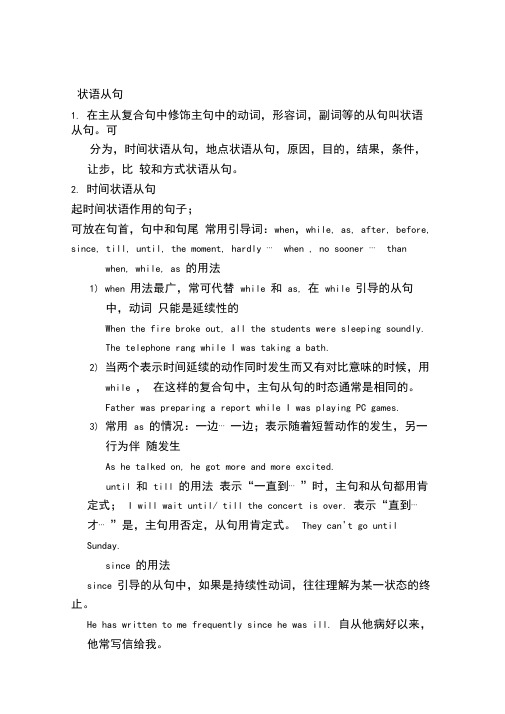
状语从句1.在主从复合句中修饰主句中的动词,形容词,副词等的从句叫状语从句。
可分为,时间状语从句,地点状语从句,原因,目的,结果,条件,让步,比较和方式状语从句。
2.时间状语从句起时间状语作用的句子;可放在句首,句中和句尾常用引导词:when,while, as, after, before, since, till, until, the moment, hardly ⋯when , no sooner ⋯than when, while, as 的用法1)when 用法最广,常可代替while 和as, 在while 引导的从句中,动词只能是延续性的When the fire broke out, all the students were sleeping soundly.The telephone rang while I was taking a bath.2)当两个表示时间延续的动作同时发生而又有对比意味的时候,用while ,在这样的复合句中,主句从句的时态通常是相同的。
Father was preparing a report while I was playing PC games.3)常用as 的情况:一边⋯一边;表示随着短暂动作的发生,另一行为伴随发生As he talked on, he got more and more excited.until 和till 的用法表示“一直到⋯”时,主句和从句都用肯定式;I will wait until/ till the concert is over. 表示“直到⋯才⋯”是,主句用否定,从句用肯定式。
They can't go untilSunday.since 的用法since 引导的从句中,如果是持续性动词,往往理解为某一状态的终止。
He has written to me frequently since he was ill. 自从他病好以来,他常写信给我。
初中英语状语从句详细讲解与练习(精华版)

对比训练 1
1. __A__ he heard this, he got very angry.
2. I met Lucy__B__ I was walking along the river.
3. __C__ a child, he lived in the countryside. A. when B. while C. as
4. 表示“随着…..”.常指一个行为是另一个行为的结果。 As she grew older, she became more beautiful.
while:持续性动词 /进行时
1.一般或现在情况
e.g. I like listening to music while I am doing my homework 2.将来. 情况-V一般现在时或现在进行时 e.g.— I’m going to the post office.
won in the end.
A. After B. before C. when D. then
since引导的时间状语从句
1.常译为“自从……”, 2.主句常用现在完成时,从句常用一般过去时。
1.我们自从分手以后一直没见过面。 We haven’t seen each other since we parted. 常用句型:It has been (is) + 时间段 + since从句
-- While you are there, can you get some stamps for me?
3.过去情况
e.g. I hurt my should while I was doing gym.
When: 1.当…的时候 When I was young, I went to town myself. When he receives the letter, he’ll tell us.
中考英语状语从句练习(有答案讲解)

状语从句练习【有答案讲解】1.—Keep working hard, Linda. You will surely achieve your dream _______ you don’t give it up halfway.— I will, thank you, Miss Li.A .sinceB .ifC .thoughD .until【来源】辽宁阜新【答案】B【解析】句意:——琳达,一直努力吧。
如果你不中途放弃,你将一定会实现梦想。
——我会的,谢谢你,李小姐。
since自从,与现在完成时连用;if如果,引导的条件状语从句,用一般现在时,主句用一般将来时;though尽管;until直到。
结合句意,如果不中途放弃,就一定会实现梦想,故用连词if,故选B 。
2.—Jack, remember ______ off the lights when _______your bedroom.—OK, I won’t forget, Mom.A .turning; leavingB .to turn; leaveC .turning; leftD .to turn; leaving【来源】四川达州【答案】D【解析】句意:——杰克,记得离开卧室时把灯关掉。
——好吧,妈妈,我不会忘记的。
考查非谓语动词。
上一句句意:杰克,离开卧室时记得关灯。
remember to do sth.记得去做某事(未做);remember doing sth.记得做过某事(已做)。
when doing sth.是省略了主谓语的时间状语从句。
故选D 。
3.—When is the school art festival?—It will be held on time if it______ next Monday.A .don’t rainB .won’t rainC .doesn’t rainD .didn’t rain【来源】四川南充【答案】C【解析】句意:学校的艺术节是什么时候?——如果不下雨的话,下周一将会如期举行。
中考英语状语从句归纳(附练习及答案)

中考英语状语从句归纳(附练习(Xi)及答案)要(Yao)点(Dian): 时间状语从句,由以下连(Lian)词引导:when while as after before as soon as since till /until by the time 在时间状语从句中(Zhong),要注意时态一致。
一般情况下主句是将来(Lai)时的时候,从句要用一般现在时。
1.when当。
的(De)时候mozart started writing music when he was four years old.(当(Dang))莫扎特的时候,开始写音乐作品。
2.while当。
时he visited a lot of places while he was traveling.他在旅途中参观了许多地方。
3.as在。
的同时;一边。
一边。
he smiled as he stood up.他一边站起来一边笑着。
4.after在。
之后he left the classroom after he had finished his homework the other day.前几天做完作业之后回的家。
5.before 在。
之前mr. brown had worked in a bank for a year before he came here.布朗先生来这之前已经在一家银行里工作一年了。
6.as soon as 一。
就。
(主将从现)we began to work as soon as we got there.我们一到那就开始工作。
i will write to you as soon as i get home.我一到家就给你写信。
7.since 自。
以来到现在表示自过去的一个起点时间到目前(说话时间)为止的一段持续时间。
主句一般用现在完成时,从句用一般过去时。
mr green has taught in that school since he came to china three years ago.自格林先生来中国以来,他就在这所学校教书。
中考英语复习——状语从句讲解及练习
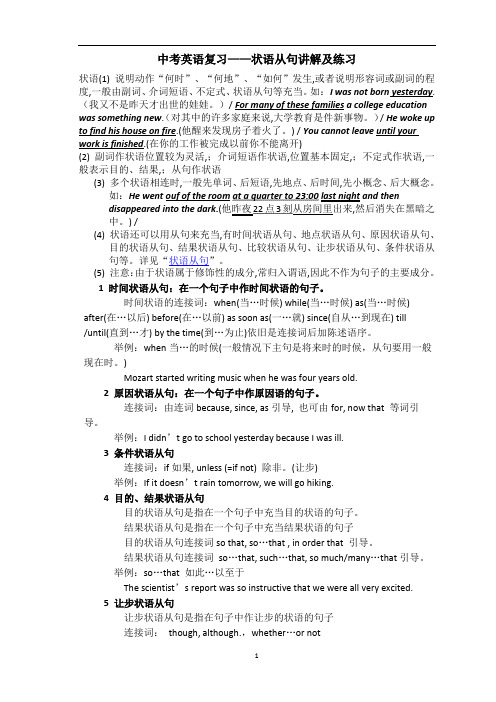
中考英语复习——状语从句讲解及练习状语(1) 说明动作“何时”、“何地”、“如何”发生,或者说明形容词或副词的程度,一般由副词、介词短语、不定式、状语从句等充当。
如:I was not born yesterday.(我又不是昨天才出世的娃娃。
)/ For many of these families a college education was something new.(对其中的许多家庭来说,大学教育是件新事物。
)/ He woke up to find his house on fire.(他醒来发现房子着火了。
) / You cannot leave until your work is finished.(在你的工作被完成以前你不能离开)(2) 副词作状语位置较为灵活,;介词短语作状语,位置基本固定,;不定式作状语,一般表示目的、结果,;从句作状语(3) 多个状语相连时,一般先单词、后短语,先地点、后时间,先小概念、后大概念。
如:He went ouf of the room at a quarter to 23:00 last night and thendisappeared into the dark.(他昨夜22点3刻从房间里出来,然后消失在黑暗之中。
) /(4) 状语还可以用从句来充当,有时间状语从句、地点状语从句、原因状语从句、目的状语从句、结果状语从句、比较状语从句、让步状语从句、条件状语从句等。
详见“状语从句”。
(5) 注意:由于状语属于修饰性的成分,常归入谓语,因此不作为句子的主要成分。
1 时间状语从句:在一个句子中作时间状语的句子。
时间状语的连接词:when(当…时候) while(当…时候) as(当…时候)after(在…以后) before(在…以前) as soon as(一…就) since(自从…到现在) till/until(直到…才) by the time(到…为止)依旧是连接词后加陈述语序。
【英语】中考英语状语从句常见题型及答题技巧及练习题(含答案)

空后 all of us could understand her 表示前面 explained …clearly的目的,故用 so that 引导目
的状语从句,选 C。
11. She looked behind from time to time ________ she went in the dark.
【解析】
试题分析:句意:一放假,我们家总是去一些有趣的地方。
A. as soon as 一 ……就 ……。表示
时间; B. so 因此。表示结果; C. so that 以便,为了,表示目的; D. even though 尽管,即
使,表示条件。假期开始,指时间,用 as soon as:一放假就去参观有趣的地方。故选 A。
6.It is necessary for children to exchange ideas with parents from time to time ________ a good
parent-children relationship could be set up.
A. so that 【答案】 A
B. if
C. unless
【解析】
【详解】
句意 “-如果天气好,周六我们去爬崀山吧。 -好主意 ”。
A.尽管(引导让步状语从句); B.如果(引导条件状语从句); C.除非(引导条件状语从 句)。根据句意可知,译为 “如果天气好 ”,表示条件,故选 B。
16. 一 Xiao Lin, this desk is 一 Don't worry.I'll help you.
净,美丽。 if,如果,表示条件关系; since,自从 ……,表示时间关系; unless,如果不,引导条
人教版中考英语专项训练 状语从句技巧全解及练习题(含答案)

人教版中考英语专项训练必备英语状语从句技巧全解及练习题(含答案)一、初中英语状语从句1.____ I was in the US, I made a lot of American friends.A.While B.Although C.Unless D.Until【答案】A【解析】【详解】句意:当我在美国的时候,我交了很多美国朋友。
考查连词辨析。
while当……的时候,表时间;although尽管,表让步;unless除非,表条件,相当于if not;until直到,与not连用表示“直到……才”。
根据I made a lot of American friends我交了很多美国朋友,可知是在美国的时候,故选A。
2.The Italian woman didn’t feel a culture shock____it was her first time to Shanghai. A.though B.since C.if D.when【答案】A【解析】句意:这个意大利妇女没有感到一种文化冲击,尽管她是第一次来上海。
A. though尽管;B. since自从;C. if 是否,如果;D. when当---时候;根据The Italian woman didn’t feel a culture shock这个意大利妇女没有感到一种文化冲击,和it was her first time to Shanghai.她是第一次来上海之间用though 引导让步关系状语从句;故选A3.(题文)I’m sure that you will succeed in the end ___________ you give up halfway. A.until B.till C.unless D.although【答案】C【解析】试题分析:句意:如果你不半途放弃,我肯定你最终会成功的。
A. until直到,表示时间;B. till 直到,表示时间;C. unless如果不,除非,表示条件;D. although虽然,尽管。
初三中考英语状语从句讲解&练习及答案

状语从句状语从句用来修饰主句中的动词,副词和形容词的从句叫状语从句。
根据其含义状语从句可分为时间状语从句,地点状语从句,条件状语从句,原因状语从句,结果状语从句,比较状语从句,目的状语从句,让步状语从句。
1. 时间状语从句(1)时间状语从句常用when, as, while, before, after, since, till, until, as soon as等连词来引导。
例如:It was raining hard(rain hard 下大雨)when got to school yesterday.While he was doing his homework, the telephone rang.As he walked along(沿着走)the lake, he sang happily.He had learned a little Chinese before he came to China.After he finished middle school, he went to work in a factory.(2)在时间状语从句里,通常不用将来时态,用现在时态表示将来的动作或状态。
例如:I’ll ring you up as soon as I get to New York.I will tell him everything when he comes back.He won’t believe it until he sees it with his own eyes.(3)在带有till或until引导的时间状语从句的主从复合句里,如果主句用肯定式,其含义是“一直到……时”,谓语动词只能用延续性动词。
如果主句用否定式,其含义是“直到……才……”, “在……以前不……”, 谓语动词可用瞬间动词。
例如:The young man read till the light went out(熄灭).Let’s wait until the rain stops.We won’t start until Bob comes.Don’t get off(从下来)until the bus stops.【Till是指直到某一特定事件发生的时候,而在那个时刻之后,该事情或状况仍将持续。
状语从句讲解及练习

状语从句状语从句在句中作状语,修饰主句中的动词、形容词或副词等。
状语从句放在主句之前时,常用逗号分开;放在主句之后,一般不用逗号。
状语从句按其意义和作用可分为时间、条件、原因、让步、目的、结果、方式、比较、地点9种。
1.时间状语从句1) 时间状语从句常用连词有when, as, while, before, after, since, till, until, as soon as, hardly … when …, no sooner … than …., the moment等。
2) 时间状语从句一般不用将来时。
因此,主句若为将来时,时间状语从句要用一般现在时。
I’ll go on with the work when I come back tomorrow.3) 连词when, while, as都表示“当……的时候”,但有区别。
as 多用于口语中,强调“同一时间”或“一前一后”,有时还有“随着”的含义。
As he was eating his breakfast, he heard the door bell ring. (强调同一时间)As going out, it began to rain. (强调两个动作紧接着先后发生)As spring warms the good earth, all flowers being to bloom. (as有“随着”的含义)when 强调“特定时间”。
When spring comes, he feels like a trip.When he was eating his breakfast, he heard the door bell ring.while 表示的时间是一段,而不是一点。
while 有时还有对比的含义,意为“然而”。
While he was eating his breakfast, he heard the door bell ring. (强调吃饭的过程)While I was reading, he was playing. (有对比的含义)4) till / until表示“一直到……”时,主句和从句都用肯定式;表示“直到……才……”时,主句用否定式,从句用肯定式。
- 1、下载文档前请自行甄别文档内容的完整性,平台不提供额外的编辑、内容补充、找答案等附加服务。
- 2、"仅部分预览"的文档,不可在线预览部分如存在完整性等问题,可反馈申请退款(可完整预览的文档不适用该条件!)。
- 3、如文档侵犯您的权益,请联系客服反馈,我们会尽快为您处理(人工客服工作时间:9:00-18:30)。
状语从句状语从句用来修饰主句中的动词,副词和形容词的从句叫状语从句。
根据其含义状语从句可分为时间状语从句,地点状语从句,条件状语从句,原因状语从句,结果状语从句,比较状语从句,目的状语从句,让步状语从句。
1. 时间状语从句(1)时间状语从句常用when, as, while, before, after, since, till, until, as soon as等连词来引导。
例如:It was raining hard(rain hard 下大雨)when got to school yesterday.While he was doing his homework, the telephone rang.As he walked along(沿着走)the lake, he sang happily.He had learned a little Chinese before he came to China.After he finished middle school, he went to work in a factory.(2)在时间状语从句里,通常不用将来时态,用现在时态表示将来的动作或状态。
例如:I’ll ring you up as soon as I get to New York.I will tell him everything when he comes back.He won’t believe it until he sees it with his own eyes.(3)在带有till或until引导的时间状语从句的主从复合句里,如果主句用肯定式,其含义是“一直到……时”,谓语动词只能用延续性动词。
如果主句用否定式,其含义是“直到……才……”, “在……以前不……”, 谓语动词可用瞬间动词。
例如:The young man read till the light went out(熄灭).Let’s wait until the rain stops.We won’t start until Bob comes.Don’t get off(从下来)until the bus stops.【Till是指直到某一特定事件发生的时候,而在那个时刻之后,该事情或状况仍将持续。
Until 是指直到某一特定事件发生的时候,而讲话的人在自己心里认为,在那个时刻之后,该事情或该状况将中止(不怎么可能持续)。
固定组合里from morning till night,till/until是不能替换的,】2. 条件状语从句(1)条件状语从句通常由if, unless引导。
例如:What shall we do if it snows tomorrow?Don’t leave the building unless I tell you to.(2)在条件状语从句里,谓语动词通常用现在时态表示将来的动作或状态。
例如:I’ll help you with your English if am free tomorrow.He won’t be late unless he is ill.(3)“祈使句+ and (or)+ 陈述句”在意思上相当于一个带有条件状语从句的复合句。
例如:Hurry up, or you’ll be late. =If you don’t hurry up, you’ll be late.Study hard and you will pass the exam. =If you study hard, you will pass the exam.3. 原因状语从句(1)原因状语从句通常由because, since, as引导。
例如:He didn’t come to school because he was ill.As it is raining, we shall not (不得;不应该)go the zoo.Since you can’t answer the question, I’ll ask someone else.(2)because表示直接原因,语气最强。
Because引导的原因状语从句多放在主句之后。
回答由why提出的问题,只能用because。
As和since语气较弱,一般用来表示明显的原因。
由as 和since引导的原因状语从居多放在句首。
例如:------Why aren’t going there?------Because I don’t want to.As he has no car, he can’t get there easily.Since we have no money, we can’t buy it.(3)because和so不能同用在一个句子里。
4. 结果状语从句(1)结果状语从句由so…that, such…that, so that引导。
例如:He is so poor that he can’t buy a bike for his son.She is such a good teacher that everybody likes her.My pencil fell under the desk, so that I couldn’t see it.(2)so…that语such...that可以互换。
例如:在由so...that引导的结果状语从句中,so是副词,与形容词连用。
其结构是: “...so + 形容词(副词)+ that + 从句”。
例如:He was so glad that he couldn’t say a word.The hall is so big that it can hold 2,000 people.Mother lives so far away that we hardly ever(几乎不,从来不)see her.在由such…that引导的结果状语从句中,such是形容词,它修饰的可以是单数或复数可数名词,也可以是不可数名词;名词前面可以带形容词,也可不带。
如果是单数可数名词,前面需加不定冠词a或an。
例如:It was such a hot day that nobody wanted to do anything.He had such long arms that he could almost touch the ceiling.(天花板)He made such rapid progress that he did very well in the mid-term.有时上述两种结构是可以互换的。
例如:It was such a wonderful film that all of us wanted to see it again.=The film was so wonderful that all of us wanted to see it again.It is such an important match that nobody wants to miss it.=The match is so important that nobody wants to miss it.(3)如果名词前由many, much, little, few等词修饰时,只能用so, 不用such。
例如:Soon there were so many deer that they ate up all the wild roses.He has so little time that he can’t go to the cinema(去看电影)with you.5. 比较状语从句比较状语从句通常由as…as, 比较级+ than…等连词引导。
例如:Tom runs faster than John does.This classroom is as big as that one.6. 目的状语从句(1)目的状语从句通常由so that, in order that(为了,以便)引导。
例如:We started early so that we could catch the first train.He studies hard so that he could work better in the future.We used the computer in order that we might save time.(2)so that既可引导目的状语从句,又可引导结果状语从句。
区别这两种从句的办法有两个:1)目的状语从句里往往带有情态动词can, could, may, might等。
2)从意思上看,目的状语从句往往表示的目的很明确。
例如:Speak clearly so that they may understand you. (目的状语从句)Jack is badly ill so that he has to rest. (结果状语从句)7. 让步状语从句(1)让步状语从句通常由although, though等连词引导。
例如:Though he is young, he knows a lot.Although I am tired, I must go on working.(2)although(though)不能用在同一个句子中。
例如:我们不能说:Though it was raining hard, but he still went out.应该说:Though it was raining hard, he still went out.或It was raining hard, but he still went out. 8. 地点状语从句地点状语从句常常由where来引导。
例如:Go where you like.Where there is a will, there is a way.总结:状语从句分类及常用连词:类别连词时间状语从句when, whenever, while, as, before, after, since, till, once(一旦)地点状语从句where, wherever原因状语从句because, since, as, for, now that(既然,由于)etc. (et cetera,等于and so on)目的状语从句in order that(为了,以便), so that, that, etc.结果状语从句so…that, so that, such…that, that, etc.条件状语从句if, unless, as(so)long as, etc.让步状语从句though, although, even if, even though, however, whatever, as, etc.比较状语从句as…as, so…as, than, etc.方式状语从句as, as if, as though, etc.练习一一. 单项填空1. _______ he’s old, he can still carry this heavy bag.A. ThoughB. SinceC. ForD. So2. ---Do you know if he _______ to play basket ball with us?---I think he will come if he ______ free tomorrow.A. comes; isB. comes; will beC. will come; isD. will come; will be3. In the zoo if a child _____ into the water and can’t swim, the dolphins may come up ______ him.A. will fall; to helpB. falls; to helpC. will fall; helpD. falls; helping4. I don’t remember ________ he worked in that city when he was young.A. whatB. whichC. whereD. who5. We will stay at home if my aunt ________ to visit us tomorrow.A. comesB. comeC. will comeD. is coming6. The police asked the children _______ cross the street ________ the traffic lights turned green.A. not; beforeB. don’t; whenC. not to; untilD. not; after7. I was late for class yesterday _______ there was something wrong with my bike.A. whenB. thatC. untilD. because8. I’ll go swimming with you if I ________ free tomorrow.A. will beB. shall beC. amD. was9. In the exam, the ________ you are, ______ the _______ mistakes you will make.A. careful; littleB. more careful; fewestC. more careful; fewerD. more careful; less10. You should finish your lessons _______ you go out to play.A. beforeB. afterC. whenD. while11. I hurried _____ I wouldn’t be late for class.A. sinceB. so thatC. as ifD. unless12. When you read the book, you’d better make a mark _______ you have any questions.A. whichB. thatC. whereD. though13. The teacher raised his voice _______ all the students could hear him.A. forB. so thatC. becauseD. in order14. He took off his coat _______ he felt hot.A. becauseB. asC. ifD. since15. It is ______ that we’d like to go out for a walk.A. a lovely dayB. too lovely a dayC. so lovely a dayD. such lovely a day16. Mary had ______ much work to do that she stayed at her office all day.A. suchB. soC. tooD. very17. _______ I felt very tired, I tried to finish the work.A. AlthoughB. BecauseC. AsD. As if18. ______ the day went on, the weather got worse.A. WithB. SinceC. WhileD. As19. ______ well you can drive, you must drive carefully.A. So long asB. In order thatC. No matter howD. The moment20. Write to me as soon as you ________ to Beijing.A. will getB. getC. gettingD. got二. 根据中文意思完成下列英语句子1. 不管他跟我开什么玩笑,我都不生气。
